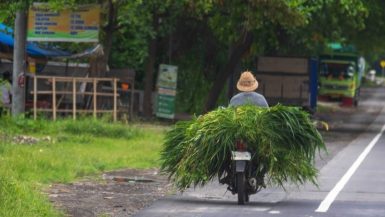
Long-frequented by Western travelers, there’s a high chance you’ve heard of, or even visited, Indonesia’s most popular Island. Bali might seem overrun by tourists, but it’s for good reason. The Island of the Gods is a spiritual mecca, surfer’s paradise, and party haven all in one, so is Bali safe?
Indonesia is one of the safest destinations in Asia and crime rates have been decreasing every year since 2010. Still, high poverty, inefficient policing, and civil unrest in some parts of the country might have you wondering how Bali compares.
Nowhere is without its flaws, and when it comes to natural disasters and petty crime, Bali isn’t 100 percent problem-free. Although, there’s no reason to feel unsafe in Bali and it’s a great place for solo travelers. From the transport to the tap water, our insider’s guide tells you everything you need to know and everything you should avoid. Let’s get into it.
Is Bali safe to visit?

There are tons of reasons to visit Bali, and the risks shouldn’t put you off. The truth is, the island is very safe, but that doesn’t mean you shouldn’t take simple precautions everywhere you go and be street smart.
Economic crisis paired with ever-increasing tourism means petty crime is at an all-time high. Opportunistic criminals prey on unsuspecting visitors who easily lose inhibitions when going along with the free vibes of the island. Pickpocketing, money scams, and snatch-and-grab thefts, particularly on motorbikes, are the most commonly reported crimes against tourists.
There are ways to avoid these incidents. The precautions in Bali come down to taking extra care of your belongings, leaving valuables at home, and knowing your limits when making the most of the fantastic nightlife. Still, natural disasters play a big role in the risks of visiting the island, too.
Indonesia sits on the Ring of Fire, making it prime territory for volcanic activity. The country boasts more active volcanoes than anywhere in the world with 76 spread across Sumatra, Java, Celebes, and the Lesser Sundas, three of which are located on the island of Bali itself. Eruptions remain an imminent risk and, in as recently as 2017, all flights out of Bali were halted due to smoke and ash clouds pluming from the mighty Mount Agung after a build-up of gases led to a violent eruption.
There is also tons of seismic activity on the Ring of Fire meaning earthquakes are common and underwater tremors put Bali and its surrounding islands at risk of tsunamis. Luckily, modern technology allows scientists to predict when all of these events might happen. There’s nothing we can do to prevent them, but listening to official broadcasts, staying up to date with local media, and reducing your time in isolated areas can help you keep safe.
Is Bali safe for solo travelers?

Bali is such a well-trodden piece of paradise that it’s safe for all types of travelers, from families to solo females. That said, you shouldn’t throw common sense out the window, and women on their own, in particular, should exercise extra caution when night falls or traveling around remote areas.
It can also be easy to throw caution to the wind and embark on an adrenaline-fueled adventure, engage in a new sport, or push your limits in Bali. As a solo traveler, you’re at more risk if you’re without family and friends knowing your whereabouts or there to help you navigate the medical system.
Bali is big on extreme experiences. From surfing to scuba diving, hiking to cliff jumping, paragliding to abseiling, there’s no limit to the adventure-packed activities on offer. But with Indonesia’s health and safety regulations, or lack thereof, you’re putting yourself at a heightened risk of injury than in your home country.
Indonesia also has limited medical access and patients often need to prove their financial status or insurance status before being treated by a medical professional. This is made all the more complicated if you’re a solo traveler without friends to assist in the process.
Still, Bali has been considered one of the best places for solo adventures because the island is so easy to get around and is even a top choice for first-timers traveling alone. Meeting people is without its difficulties, and as long as you invest in insurance and avoid isolating yourself too much, your trip should be problem-free.
Is transport safe in Bali?

Public transport is extremely limited in Bali. There are a few bus routes that operate on the island, but they are mostly frequented by commuting locals and are notoriously unreliable. In fact, you’ll find no public transport options in the most popular areas of Canggu, Seminyak, and Kuta but this doesn’t mean Bali is hard to get around.
Hiring a car and driver is a cheap and efficient way to get around Bali, especially if you plan to travel a long distance. Still, by far the most popular mode of transport is a scooter. Scooter taxis are easy to book on the Grab and Gojek apps and often arrive in minutes. Deliveries of all kinds are done by scooter and it’s not uncommon to see whole families piling onto the back of a Honda Vario like it’s nothing – we told you the healthy and safety laws are questionable.
Many tourists choose to rent their own scooter or motorbike to navigate Bali. This is a very cheap and convenient way to get around and can be safe if you know how to drive a bike. Unfortunately, many visitors rent bikes without any previous driving experience or without possessing the appropriate license. This not only results in police fines but has led to an epidemic of bike collisions on the island. Hundreds of tourists and locals can and do get seriously injured every year from scooter accidents.
Erratic drivers, unregulated hazards, like dogs and people, terrible road conditions, and dense traffic all make driving Bali’s roads less than safe. Scooter accidents are a daily occurrence and around 150 people die every year as a result of traffic collisions in Bali. That is a huge number for an island of its size, but it still doesn’t account for all the unreported incidents in which police don’t interfere. Drunk driving incidents are also, sadly, very common. If you want to stay safe in Bali, don’t drive without a license and never get on a bike after a drink.
Another risk of driving scooters in Bali is the snatch-and-grab robberies that have become a regular occurrence. A scooter makes the perfect getaway vehicle for opportunistic thieves and while one persecutor drives, the other will reach out to snatch mobile phones, handbags, and jewelry from unsuspecting passengers or distracted drivers.
Pairs of thieves operate in all areas of the island but especially in the capital of Denpasar, the busy Sunset Road in Seminyak, and the quiet shortcuts of Umalas. Stopping at traffic lights is when you’re most likely to be targeted. Thieves can disguise themselves easily among the densely packed mopeds building up at a red light, and it’s not uncommon for them to dip their hands into backpacks unnoticed, or even use knives to cut through bag straps and swipe possessions.
And if you’re really unlucky, thieves have also been known to kick victims from bikes so that they can’t be followed. This is common when snatching jewelry so that the bling in question also comes away easier.
The only way to avoid this crime is to limit the personal belongings you have in possession on a bike, hide or remove jewelry before driving, avoid driving in unlit areas or treacherous shortcuts where you’re forced to slow down, and always stow bags in your bike seat or wear them on your front (if you’re a passenger) where you can protect them.
Is it safe to drink tap water in Bali?

It might have wonderful waterfalls and sacred fountains but the tap water in Bali isn’t recommended for drinking. While it can be boiled and filtered, it’s best to avoid ice made from frozen tap water and even brushing your teeth with the stuff in more remote areas as any ingestion can cause stomach upset.
The main issue with the tap water in Bali is the pathogens that are carried from poor water pipe infrastructure in the tropical heat. But water contamination isn’t the only problem and Bali is currently experiencing a falling water table, land subsidence, salt-water intrusion, and decreasing river water that all contribute to the poor water quality.
It’s fine to shower and bathe in the tap water in Bali but try not to swallow any when you do so, and always rinse fruit and vegetables that you’ve bought in filtered water. Although, the tap water is fine to cook with as long as it’s boiled first.
Is it safe to live in Bali?

Bali is a very safe place to live and many ex-pats choose to migrate here. Cheap prices, scorching sunshine, and a dreamy lifestyle make for great quality of life and you’ll find settled Westerners everywhere from the hippie fields of Ubud to the brunch spots in Canggu. Living in Bali comes with the same risks as visiting the island, with petty crime, bike accidents, and poor medical access being just as much a problem for ex-pats as it is for tourists.
Living in a country does come with some added benefits of being surrounded by friendly faces and locals and being able to make more informed decisions than reckless tourists might be less inclined towards. Certain VISAs also grant ex-pats better healthcare access. Worker’s rights also apply to ex-pats who have the appropriate documentation and you might even benefit from medical discounts. But healthcare is privatized and still comes at an extra cost than it could in your home country.
You’re also likely to be able to stay safe if you’re familiar with the local tongue. English is widely spoken across the island, but Bahasa Indonesia is the native language of Bali and is regarded as easy to pick up. Expats who make the extra effort to fit in and respect the culture, especially when communicating with locals, are less likely to get into trouble or more likely to get out of it.
One issue with living in Bali is that foreigners aren’t strictly allowed to buy property. Rather, they can rent land for an extended amount of years or put the land in the name of a local they trust. Expats might be at a lesser risk from scams, with Bahasa skills and local know-how, but going into business with anyone you don’t know poses a risk, and ex-pats are often done over when it comes to acquiring land.
There are also some places that are safer to live in than others. While most of the action is concentrated in the bustling neighborhoods of Canggu and Seminyak, raging nightlife can bring about more risk and petty criminals are more likely to operate in areas with lots of tourists. Pererenan, Ubud, Sanur, and Uluwatu are some of the safest of Bali’s favored neighborhoods, hence many ex-pats, families, and retirees base themselves in these areas.
7 Safety Tips for the Island of the Gods

Leave valuables at home – Whether you’re headed to a beach club, off on a hike, or on a short motorbike ride, if you don’t want to lose any belongings, leave them at home. Only travel with what you need and keep possessions close to your body in a bum-bag or money belt.
Know your limits – Bali is a party haven, but poor lapses in judgment are more likely to occur when alcohol is in the equation. Remember that cheap, local alcohol will go straight to your head and counterfeit drinks are also common. Pace yourself, never get to the point of being unaware of your surroundings, and stay with friends.
Don’t flash expensive goods – Flashing your wealth can make you an instant target, but in somewhere like Bali, this could be as simple as wearing a gold necklace or a nice watch. Jewelry, in particular, stands out to snatch-and-grab thieves so wear high necklines and long sleeves to cover goods or simply leave the bling at home.
Be respectful of local customs – Learning Bahasa is just one way to respect the culture, but Bali is a very spiritual and sacred place. The Hindu people are known for being welcoming and accepting, but disrespecting the Gods, dressing inappropriately at temples, disrupting offerings, and simply over-bartering with vendors can all put you in their bad books.
Follow media reports before and during your visit – Natural disasters shouldn’t deter you from visiting the island but it’s a good idea to keep up to date with media broadcasts and science reports before you visit, and while you’re on the island. There isn’t an official News Channel or Newspaper in Bali, so you might have to go out of your way to get information from Social Media outlets, but it will be worth it. Keeping up with current political events in Indonesia is also advised.
Bring a backup credit card – ATMs are notoriously unreliable in Bali, known for swallowing cards and even cloning them. Always bring a backup card away with you, and convert some cash before you set off, in case you lose your credit card or it gets stolen.
What should I avoid in Bali?
Bali is a dreamy vacation spot and most travelers have no problems when visiting the Island of the Gods, but there are some things you can avoid to stay safe. These include driving a scooter without a license, taking any illegal drugs, drinking tap water, drinking Arak or counterfeit alcohol, dressing disrespectfully, stepping on offerings, petting or feeding stray animals, and not doing your research before embarking on any high-octane activities.
Is it safe to travel to Bali solo?
Solo travelers should always exercise extra caution, especially at night, but Bali is a very friendly place and great for all types of tourists. Being a solo female can make things riskier, but it’s a great destination for your first trip alone and the island is easy to navigate.
When is the best time to visit Bali?
The best time to visit Bali for blue skies and little rainfall is between May and September. This is the peak of the dry season and average temperatures sit at around 85 degrees Fahrenheit. Although, the peak season, lining up conveniently with school holidays, brings hoards of tourists, and prices soar. October through to April might be the rainy season, but there are still plenty of blue skies and this is a great time to visit for fewer crowds and low season discounts.


